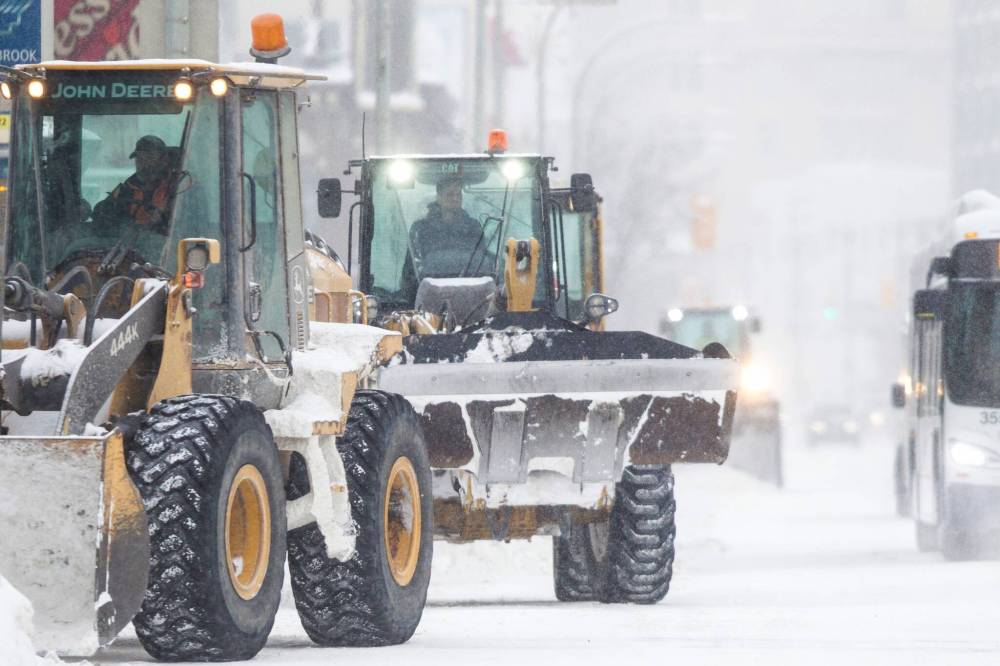Snowfall, pandemic add to massive city deficit
Expecting record $69.6 million shortfall
Advertisement
Read this article for free:
or
Already have an account? Log in here »
To continue reading, please subscribe:
Monthly Digital Subscription
$0 for the first 4 weeks*
- Enjoy unlimited reading on winnipegfreepress.com
- Read the E-Edition, our digital replica newspaper
- Access News Break, our award-winning app
- Play interactive puzzles
*No charge for 4 weeks then price increases to the regular rate of $19.00 plus GST every four weeks. Offer available to new and qualified returning subscribers only. Cancel any time.
Monthly Digital Subscription
$4.75/week*
- Enjoy unlimited reading on winnipegfreepress.com
- Read the E-Edition, our digital replica newspaper
- Access News Break, our award-winning app
- Play interactive puzzles
*Billed as $19 plus GST every four weeks. Cancel any time.
To continue reading, please subscribe:
Add Free Press access to your Brandon Sun subscription for only an additional
$1 for the first 4 weeks*
*Your next subscription payment will increase by $1.00 and you will be charged $16.99 plus GST for four weeks. After four weeks, your payment will increase to $23.99 plus GST every four weeks.
Read unlimited articles for free today:
or
Already have an account? Log in here »
Hey there, time traveller!
This article was published 06/01/2023 (1068 days ago), so information in it may no longer be current.
The City of Winnipeg is expecting a massive deficit after a barrage of snowstorms, soaring inflation rates and sustained pandemic losses.
Based on financial data up to Nov. 30, 2022, the city expects to complete last year with a $69.6-million deficit in its tax-supported operating budget, while Winnipeg Transit forecasts a separate $13.7-million shortfall.
“As far as I know, this is record-setting in terms of the level of deficit. But (it’s) to be expected… In one year, (the) multitude of challenges (we had) is quite shocking, so obviously we’re hoping for more sustainability and predictability in 2023,” said Coun. Jeff Browaty, chairman of council’s finance committee.

Mother Nature played a key role in the shortfall, with Winnipeg’s 2022 snow-clearing budget now projected to hit nearly $79 million, about $44 million beyond the original budget of roughly $35 million, based on data available by the end of November.
“I took a winter holiday (in early 2022) and coming back and seeing the amount of snow on the side of the roads, it was jaw-dropping. I’m a lifelong Winnipegger, I certainly can’t recall seeing anything to that extreme (before),” said Browaty.
The city’s public works department is already warning that snow-clearing costs could climb even higher due to ample precipitation in December, with costs for that month still being tabulated. The department is now asking council’s finance committee to approve another $8.4 million of spending to cover snow and ice control costs, if the December costs exceed the amount set aside for that month.
If that extra cash is needed, as Browaty expects it will be, the city’s overall deficit would grow even higher.
COVID-19 wasn’t kind to city finances either. While the city’s 2022 budget plan anticipated $41.3 million worth of pandemic-related costs and revenue losses, when compared to Winnipeg’s original 2020 to 2023 multi-year budget, that tab is now expected to rise by an additional $12 million.
“Earlier in the year we weren’t maybe forecasting the degree of impact that we’d see from (the) Omicron (variant) at the time. That really required a lot of additional employees to come on in overtime for some of those services that had to keep operating no matter what, such as fire, police (and) transit,” said Browaty.
A city report notes the Winnipeg Fire Paramedic Service, Winnipeg Police Service and several other departments all expect to end 2022 with budget shortfalls. The city did find some savings, partly through reduced staffing costs in the community services department and COVID cost-cutting strategies. Those “financial levers” included new limits on travel and discretionary spending, as well as delayed hiring for some city staff positions.
On the upside, Browaty noted the city expects to soon receive some financial help for Winnipeg Transit. The finance chairman said the federal government has confirmed it will provide $19.4 million to ease the service’s pandemic-related losses. And the city expects about $12.4 million of transit support from the provincial government, pending approval in Manitoba’s 2023 budget, Browaty said.
Since the city does not have the money yet, that senior government assistance has not been factored into the expected deficit.
Winnipeg Transit ridership has yet to rebound to pre-COVID levels.
Meanwhile, the city is expected to take a substantial withdrawal from its financial stabilization reserve to cover the 2022 shortfall, forcing that “rainy day fund” to plummet to $10.8 million, or $60.9 million lower than its council-mandated minimum level.
Browaty said the 2023 budget will weigh in on how best to restore that fund, a recovery that may take multiple years to achieve.
joyanne.pursaga@freepress.mb.ca
Twitter: @joyanne_pursaga

Born and raised in Winnipeg, Joyanne loves to tell the stories of this city, especially when politics is involved. Joyanne became the city hall reporter for the Winnipeg Free Press in early 2020.
Our newsroom depends on a growing audience of readers to power our journalism. If you are not a paid reader, please consider becoming a subscriber.
Our newsroom depends on its audience of readers to power our journalism. Thank you for your support.

